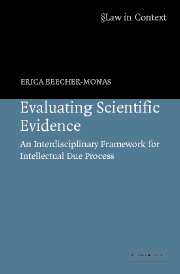Book contents
- Frontmatter
- Contents
- Acknowledgments
- Evaluating Scientific Evidence
- Introduction
- 1 Triers of science
- 2 What is intellectual due process?
- 3 A framework of analysis
- 4 Toxic torts and the causation conundrum
- 5 Criminal identification evidence
- 6 Future dangerousness testimony: The epistemology of prediction
- 7 Barefoot or Daubert? A cognitive perspective on vetting future dangerousness testimony
- 8 Future dangerousness and sexual offenders
- 9 Models of rationality: Evaluating social psychology
- 10 Evaluating battered woman syndrome
- Conclusion
- Index
- The Law in Context Series
7 - Barefoot or Daubert? A cognitive perspective on vetting future dangerousness testimony
Published online by Cambridge University Press: 04 December 2009
- Frontmatter
- Contents
- Acknowledgments
- Evaluating Scientific Evidence
- Introduction
- 1 Triers of science
- 2 What is intellectual due process?
- 3 A framework of analysis
- 4 Toxic torts and the causation conundrum
- 5 Criminal identification evidence
- 6 Future dangerousness testimony: The epistemology of prediction
- 7 Barefoot or Daubert? A cognitive perspective on vetting future dangerousness testimony
- 8 Future dangerousness and sexual offenders
- 9 Models of rationality: Evaluating social psychology
- 10 Evaluating battered woman syndrome
- Conclusion
- Index
- The Law in Context Series
Summary
Despite the well-known shakiness of its scientific credentials, expert testimony continues to be prevalent at capital-sentencing hearings. It is difficult to imagine a more critical setting for accurate expert testimony. Yet, because the rules of evidence do not generally apply (and, even where they supposedly apply, they are ignored in practice), future-dangerousness testimony goes unexamined. The reason often given for admitting evidence without regard to evidentiary rules is that the capital jury is charged with making reasoned moral judgments about the fate of the defendant – a policy decision rather than a factual finding. Policy makers as well as factfinders, however, require relevant and reliable information for their task. The dynamics of jury decision making in the context of capital-sentencing decisions demonstrate the importance of recognizing that the relevance requirement is a constitutional concern of fundamental fairness and how that requirement plays out with respect to expert testimony on future dangerousness.
To reach a just decision, jurors are supposed to be provided with “information relevant to the imposition of the sentence and provided with standards to guide its use of the information.” The purpose of testifying experts – that is, witnesses without personal knowledge of the defendant or incident – is the same in capital sentencing as it is at trial: to inform the jury about matters outside their common experience in order to assist the jury in making an accurate and just determination.
- Type
- Chapter
- Information
- Evaluating Scientific EvidenceAn Interdisciplinary Framework for Intellectual Due Process, pp. 146 - 154Publisher: Cambridge University PressPrint publication year: 2006

